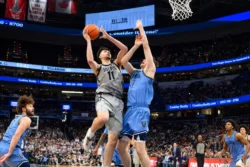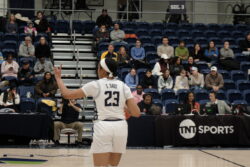Earlier this month, during a basketball game between the University of Arizona and UCLA, cameras settled on Arizona alumnus and former NBA star Gilbert Arenas. The 32 -year-old sat courtside, hand resting on his chin—his iconic lack of interest visible on his face. NBA legend Bill Walton, the game’s commentator, spoke frankly about the man Washington Wizards fans once lovably referred to as “Agent Zero.”
“Gilbert lost his mind,” Walton said. “Life is a series of choices. We wish Gilbert the best.”
Walton’s recent comments are a reminder of a persistent and, frankly, incorrect attitude regarding the career of Gilbert Arenas, a D.C. legend whose behavioral issues have unfairly overshadowed his past success and the true reasons for his rapid decline: injury and bad timing.
Arenas’ behavioral slide, which began on Christmas Eve of 2009, has been discussed ad nauseam in the sports commentary community. Arenas admitted to storing unloaded firearms inside the Wizards’ locker room and, a week later, further investigation revealed that a gambling dispute between Arenas and teammate Javaris Crittenton had reportedly prompted both men to draw pistols on each other inside the Verizon Center.
Then, in one of the strangest behavioral decisions in NBA history, Arenas, along with his teammates, decided to mock his criminal situation in a cringe-worthy pre-game stunt. The Wizards surrounded Arenas in a circle, where he proceeded to pretend to draw and shoot guns at his teammates. He was hastily suspended for the rest of the season by the NBA.
However, like Metta World Peace, Stephen Jackson, and Carmelo Anthony, all NBA players who have served lengthy NBA suspensions, Gilbert Arenas served his time and came back. By the start of the 2010-2011 season, Arenas was in a Wizards uniform, quickly picking up where he had left off. Averaging just over 17 points per game, Arenas was suddenly traded to the Orlando Magic, ending his seven-year Wizards career.
The trade couldn’t have come at a worse time. Arenas immediately became the backup point guard for the Magic behind Jameer Nelson, an unfamiliar role for the superstar. Unsurprisingly, his stint with the Magic did not last long. Waived by season’s end, Arenas had a brief stint with the Memphis Grizzlies, but was out of the NBA by 2012. He found temporary refuge with the Chinese Basketball Association’s Shanghai Sharks during the 2012-2013 season, but was no longer on the roster at the start of this year.
So, let’s review. After a serious lapse in judgment that cost him 50 games, Arenas served his time, returned, led the Wizards in scoring for 24 games, and then was traded. Through all of these fluctuations, he battled severe injury, eventually drifting out of the NBA. With all this information in mind, how do we define Arenas’ career? Is he the cautionary tale that critics like Walton label him as, or was he a great player who simply fell victim to extenuating circumstances? I choose the latter.
First, consider his accolades. From the 2004-2005 season through the 2006-2007 season, Arenas averaged 27.7 points, 5.7 assists, and 4.3 rebounds per game, including a 60-point scoring burst in 2006, making him one of only 21 players in NBA history to reach the 60-point mark.
In the best (and most healthy) years of Arenas’ playing career, his scoring and point guard prowess were overshadowed by some of the best players to ever play the game. Add an unfortunately timed trade and persistent injuries, and you have a player whose talent was inexplicably hidden from the public eye.
Statements like “lost his mind,” to quote Walton, aren’t for players like Gilbert Arenas. I don’t believe Arenas will play in the NBA again, but I also don’t believe a bizarre patch of irresponsible behavior should overshadow the life he injected into the D.C. basketball community. It’s time we redefine Agent Zero’s legacy.





